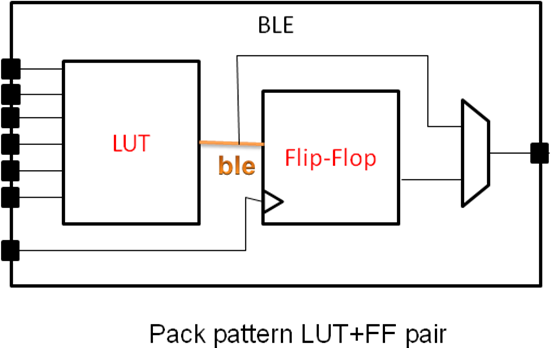LUT with FlipFlop Example¶
An example of the classical LUT with FlipFlop pair shown in Figure 31 - Pack Pattern Example of the “Architecture Reference” section of the Verilog to Routing Documentation demonstrating the <pack_pattern> tag.

Fig. 31 - Pack Pattern Example
pair.sim.v¶
19 20 21 22 23 24 25 26 27 28 29 30 31 32 33 34 35 36 37 38 39 40 41 42 43 44 | `include "./lut4/lut4.sim.v"
`include "./dff/dff.sim.v"
`include "./omux/omux.sim.v"
module PAIR (
I,
CLK,
O
);
input wire [3:0] I;
input wire CLK;
output wire O;
(* pack="LUT2FF" *)
wire lut_out;
LUT4 lut (.I(I), .O(lut_out));
wire ff_out;
DFF dff (.CLK(CLK), .D(lut_out), .Q(ff_out));
parameter FF_BYPASS = "F";
OMUX #(.MODE(FF_BYPASS)) mux(.L(lut_out), .F(ff_out), .O(O));
endmodule
|
pair.model.xml¶
1 2 3 4 5 6 7 8 9 10 11 12 13 14 15 16 17 18 19 20 | <?xml version="1.0"?>
<models>
<model name="DFF">
<input_ports>
<port is_clock="1" name="CLK"/>
<port clock="CLK" name="D"/>
</input_ports>
<output_ports>
<port clock="CLK" name="Q"/>
</output_ports>
</model>
<model name="LUT4">
<input_ports>
<port combinational_sink_ports="O" name="I"/>
</input_ports>
<output_ports>
<port name="O"/>
</output_ports>
</model>
</models>
|
pair.pb_type.xml¶
1 2 3 4 5 6 7 8 9 10 11 12 13 14 15 16 17 18 19 20 21 22 23 24 25 26 27 28 29 30 31 32 33 34 35 36 37 38 39 40 41 | <?xml version="1.0"?>
<pb_type xmlns:xi="http://www.w3.org/2001/XInclude" name="PAIR" num_pb="1">
<clock name="CLK" num_pins="1"/>
<input name="I" num_pins="4"/>
<output name="O" num_pins="1"/>
<pb_type blif_model=".subckt DFF" name="dff" num_pb="1">
<clock name="CLK" num_pins="1"/>
<input name="D" num_pins="1"/>
<output name="Q" num_pins="1"/>
<T_setup clock="CLK" port="DFF.D" value="10e-12"/>
<T_hold clock="CLK" port="DFF.D" value="10e-12"/>
<T_clock_to_Q clock="CLK" max="10e-12" port="DFF.Q"/>
</pb_type>
<pb_type blif_model=".subckt LUT4" name="lut" num_pb="1">
<input name="I" num_pins="4"/>
<output name="O" num_pins="1"/>
<delay_matrix in_port="LUT4.I" out_port="LUT4.O" type="max">
30e-12 20e-12 11e-12 3e-12
</delay_matrix>
</pb_type>
<interconnect>
<mux input="dff.Q lut.O" name="mux" output="PAIR.O">
<metadata>
<meta name="fasm_mux">
dff.Q : mux.F
lut.O : mux.L
</meta>
<meta name="type">bel</meta>
<meta name="subtype">routing</meta>
</metadata>
</mux>
<direct input="PAIR.CLK" name="dff-CLK" output="dff.CLK"/>
<direct input="lut.O" name="dff-D" output="dff.D">
<pack_pattern in_port="lut.O" name="pack-LUT2FF" out_port="dff.D"/>
</direct>
<direct input="PAIR.I[0]" name="lut-I[0]" output="lut.I[0]"/>
<direct input="PAIR.I[1]" name="lut-I[1]" output="lut.I[1]"/>
<direct input="PAIR.I[2]" name="lut-I[2]" output="lut.I[2]"/>
<direct input="PAIR.I[3]" name="lut-I[3]" output="lut.I[3]"/>
</interconnect>
</pb_type>
|
Blackbox detection¶
Model of the leaf
pb_typeis generatedLeaf
pb_typeXML is generatedAll dependency models and
pb_types are included in the output files
Carry chain inference¶
pack_patterninference -pack_patterns defined on wires withpackattributes should be propagated topb_typeXMLs